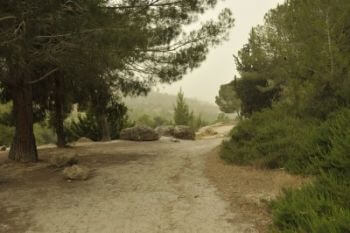
Today’s liturgical readings give us an opportunity to examine the actions of two characters in the Bible – King Solomon and a Greek woman – who lived in different times, under different circumstances, but who found themselves on the same path.
So, let’s look at their story the way God would.
Let’s suspend time. Cover your clocks. Turn off the cell phone. What time is it? We don’t know … we are simply looking at the history of our faith as one big lump … one big story … timeless, and filled with timeless lessons.
Imagine a road … a long road, upon which many make their journeys.
In one direction walks King Solomon – a chosen son, leader of God’s chosen people. He is walking toward a hill with tools in his hands.
In the other direction walks the Greek woman – a mother, carrying with her nothing more than a tiny slice of hope … perhaps, her last hope.
They pass on the road, probably ignoring one another as they make their journeys – one toward God, the other to his gods, as in lower-case “g.”
Let’s consider the woman … her story is in today’s Gospel.
She is Greek, a Gentile, whose daughter has become possessed by an evil spirit. Being a good Gentile, she probably tried everything – doctors, fortune tellers, praying to the idols she likely had on her fireplace mantle. But nothing worked and she feared the demon inside her daughter would consume her.
She was down to her last hope and was on this road seeking the man from Galilee, who she did not know. A Jew who she heard was a great prophet, a healer, possibly even the son of God.
A God she didn’t even believe in … but, she was desperate.
In our first reading, we see Solomon on a different journey. Ironically, he knew God. At one point in time, he had the full blessing of the God of Abraham and was raised as the leader of his people.
But over time, his ambitions had led him astray. He had 700 wives and 300 concubines … that’s 1,000 women – many from foreign lands with important political connections. Many who were not Jews and many who held on to their own cultural traditions, such as worshipping the false gods of the day.
Astarte, the goddess of war and sex; Milcom, the god whose role was human sacrifice (usually babies); Chemosh, known as a “supreme god” for the idol worshippers. Solomon participated in their worship, to the point where he built high places of worship to them.
In other words, he was heading in the opposite direction on that timeless day when these two characters passed each other’s shadows. Instead of running to the God of his fathers, he was running away.
And God noticed both.
From his vantage point, he could see the choices they were making.
To one, he granted healing and peace for showing perseverance and great faith, even in a power that she did not understand.
To the other, a sentence of destruction for losing his faith and failing to follow the example of his father, King David.
The lessons are pretty clear.
That road we have been watching? It’s the same road we find ourselves on today.
We may know God or think we know Him. Or we may be new to this whole “religion thing” and be quite uncertain about our faith. Or perhaps we don’t care.
Doesn’t matter … we are on the path and we have free will. We can control which direction we walk.
The choices we make hold the same promise of salvation or damnation – just like they did for Solomon and the Greek woman.
Are we paying attention?
I imagine the final scene of this timeless vision of the journey on the road – OUR journey on OUR road – shows the final passing of our characters as they head back to their home base.
One of them is confident that he has the whole world of his many passions in the grasp of his hand.
The other is trembling with the news she had just heard from the mouth of that prophet, who she now knows in the depth of her heart. She picks up speed as she rushes home to see the truth.
She barely notices the man on the other side, walking in quite the opposite direction.
